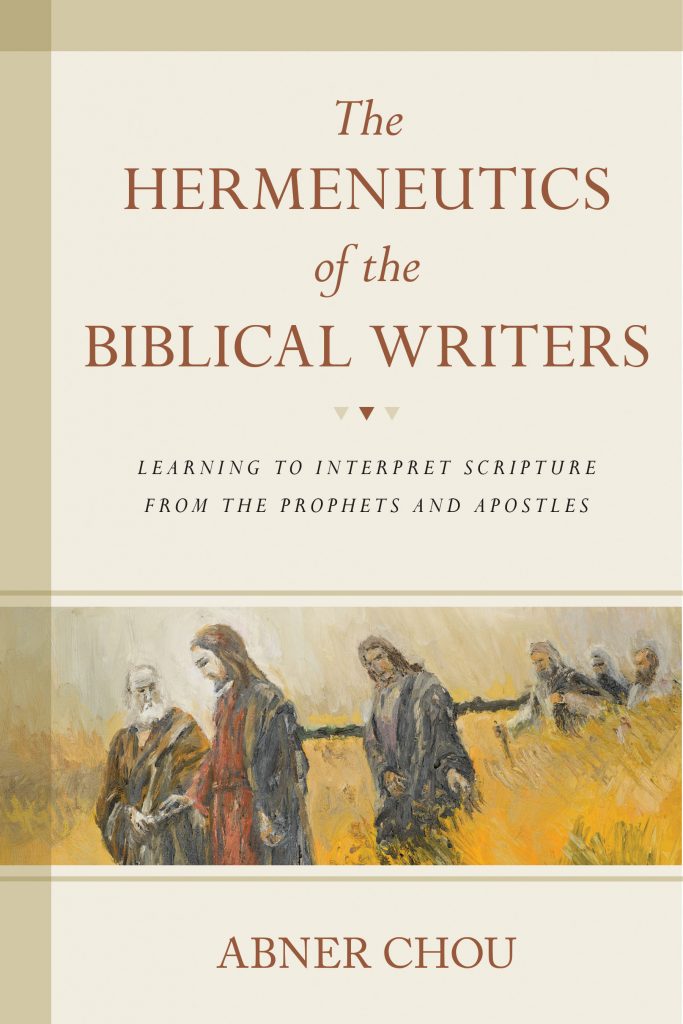Book Review
Contents
The book entitled “The Hermeneutics of Biblical Writers” details the notion that Prophets and Apostles from both the New and Old Testaments saturated themselves in Scripture. Specifically, that they had a hermeneutical method of interpretation that produced both meaning and significance. The book’s author Abner Chou sets out on a quest to account for both authorial intent and authorial logic using principles of intertextuality.
Throughout the pages of the book, there are various examples of the use of Scripture involving biblical characters to highlight the specifics about their methods of interpretation. Often where it is necessary to go beyond the surface of Scriptural references elsewhere. Such as with allusions in language, or with word-by-word comparisons from one account of a biblical matter to another. The author uses numerous specifics with precision to demonstrate the interconnectedness and authorial logic to reveal to us how to draw upon Scripture to understand what the word of God says. As a Bible student, this is crucial to understand the word as the biblical authors intended as we seek its significance and ramifications to follow it.
Introduction
Early in my reading of this book, I was fascinated by the idea of “authorial logic” as compared to “authorial intent.” Nearly dismissive of the idea because I had come to recognize that God is not logical or illogical, but alogical. Since logic or critical thinking is a human framework of thought, and God is the Creator of such a framework, God is an alogical being. It is currently my view that the explanation of the LORD’s ways and thoughts rest within His aseity. After all, as we see in Scripture, “For My thoughts are not your thoughts, either is your ways my ways (Isaiah 55:8).” So, I have concluded that the LORD must be alogical, in the sense that the LORD is beyond or outside the bounds of logic itself. Not illogical, or contrary to logic, but separate or distinct. Where, more pointedly, logic and reason are subordinate to the LORD.
Upon further reading and understanding Chou’s perspective, I became reminded about authorial intent and that the primary Author is divine who chooses to communicate through His created people. We are created in His image to include some of His attributes. If He wants to structure our way of thinking within a cause-and-effect framework for His glory and purposes, I want to make it my priority to embrace and honor that in the field of hermeneutics. So, reading on into the book, I was more tentatively open to see what Chou had to say. Specifically, I spent many hours with his work as he set about the quest of authorial logic, which is integral to both prophetic and apostolic hermeneutics. Toward the end of his book, Chou’s conclusion was to claim the prophetic and apostolic hermeneutic as the Christian hermeneutic and, ultimately, our hermeneutic.
The Prophetic Hermeneutic
It is with numerous references that Chou makes the case that prophets were not only scholars of Scripture, but also exegetes and theologians. They were steeped in the word of God as their writings and conduct reflected an immersion of understanding among biblical authors from before their time. Prophets were not unintelligent or biblically illiterate people. As Old Testament authors, they referenced numerous earlier Old Testament writings. A practice today understood as intertextuality to affirm and build upon new revelation.
By various examples, theological development becomes written among Old Testament books to highlight the nature of the prophetic hermeneutic. Whereas precise exegesis of texts naturally flows into theological progression down through the centuries.
As demonstrated that the prophetic hermeneutic is widespread, prophets pay close attention to general ideas in addition to precise verses, phrases, and words. Indeed, this occurs throughout the entire canon. In just one example, Chou refers to the eagle metaphor in the language of Exodus. Israel’s corresponding delivery from exile was much later referenced by David and Isaiah. Such prophetic hermeneutical recognition applies to wisdom literature and law, along with major and minor prophets. In Chou’s words, “The evidence for exegetical accuracy is in the text not only in general tenor but also in its details.”
While I do not fully understand or agree with the counterpoint objections presented in the book, Chou makes Scripturally sound arguments to mitigate them — centered on the progressive revelation that stem from ramifications of the text. The prophets knew “the what” of historical Scripture to further convey meaning in their writings. Prophets of old were also concerned with the “now what” or “what do we do with this” implications of what they understood. Redemptive history unfolded through the use of their hermeneutical outcomes.
Chou considerably enhances my view of the prophets and their role in the development of Systematic Theology in contrast to Biblical Theology. Due to the prophets’ overall composite view of Israel’s eschatological history. That is, they knew the theological implications from both a systematic and biblical perspective. They knew the development and advancement of God’s redemptive plan through the replacement of one covenant to another.
The Spirit of God’s influence toward directionality and revelation appears sparsely placed. Particularly from Chou’s prophetic hermeneutic rationale and arguments against objections. Did the prophets and apostles write more than they knew? My view is both yes and no, rather than only “no.” Yes, in the sense that God inspires all Scripture (2 Tim 3:16). No, in the sense that they were well studied in Scripture to support Chou’s view of authorial logic. My view is ambidextrous in thinking this way since two conditions can overlap or hold at once from an alogical perspective.
To walk through the examples below, further theological development among prophets shows how they are theologians with accurate hermeneutical capabilities. They are said to set a trajectory about how God’s plan develops to achieve His promises and aims.
The Abrahamic and Mosaic covenants become intertwined into the Davidic covenant. While the Davidic covenant brings into it some attributes of the Noahic covenant, meaning, Noah can plant a vineyard as God restrains the effects of the Fall to move creation back toward its original sabbath rest. No longer does the earth yield thorns, thistles, and weeds. At least to the written extent and pronouncement at the curse of the Fall.
The Davidic covenant obtains rest from the Mosaic conquest of Canaan through Joshua. As incorporated by the promises of Abrahamic, Mosaic, and Noahic covenants, “God has made the weight of redemptive history fall upon the Davidic dynasty.” All covenants converge into one Davidic covenant that, in turn, extends to an eschatological prophecy and reality in fulfillment of God’s promise to restore His people and creation.
Chou’s rationale is understood, accepted, and appreciated, but it concerns me that the Spirit of God does not get explicit theological treatment of this to understand the prophetic hermeneutic. That, in my mind, limits a full understanding and credibility of the prophetic hermeneutic as described and advocated. Let us know and interpret what the Lord is doing and is going to do as a continuing revelation as the canon becomes formed. The prophets were uniquely placed participants as vessels of the Lord. Interpreted revelation does not just sit with the people of God to figure things out within Scripture by their developed capabilities. When it comes to God’s purposes, they were not well developed among themselves. Without question, there is certain enlightenment that has occurred by divine involvement (1 Cor 1:27).
Theological development goes further as prophetic hermeneutic recognition extends into the apostolic hermeneutic. Through the prophets Amos, Hosea, and Micah. Amos clarifies that God will keep His promises while the house of David has collapsed. Hosea affirms a new, or a second David by God’s promises to fulfill His Davidic covenant. In time, Micah prophesies that the Messiah shall be born in Bethlehem as a second King since David was born there. The Messiah will enter the wilderness to be tempted to fulfill David’s role and restore his royal house. Again, theological principles are derived from the wisdom literature, and law, to include major and minor prophetic contributions.
Accordingly, Chou wrote that the prophetic hermeneutic came through the great intellectual insight of people who excelled at exegesis with profound capabilities. The hermeneutic of biblical prophets were from their depth of understanding to rightfully interpret meaning and significance. Cast, as they were, profound biblical thinkers and writers. Exceptional exegetes and theologians were due in part to their accuracy in handling Scripture. Intertextual precision characterizes their hermeneutic exceptionalism as necessary for careful application and theological formation.
In contrast, I would observe, this was their specific intertextual methodology of interpretation. While Chou articulates his view by compelling examples, it becomes demonstrated that the “what-of” their hermeneutical process has relevance. Yet not the “how-to” at this point per se as he continues in further depth during his treatment of the apostolic hermeneutic.
While the LORD informs Moses that He would speak through him before Pharaoh (Exodus 4:10-12), that situation occurred out of concern that Moses was “slow of speech and tongue.” Moreover, it intuitively feels somewhat out of character that prophets would confidently make pronouncements from exegetical advancements because of verbiage such as “thus saith the Lord.” So, I am a bit nervous about the confidence Chou has in the prophetic hermeneutic he claims. Certainly, no quarrel about prophetic hermeneutic recognition and its support of an apostolic hermeneutic. It only appears that specific methodology that involves the Spirit of God according to His plan and trajectory seems missing or too distant.
It is my conviction that hermeneutics is a practice and process of exegetical interpretation. It is a “how-to” effort to understand the meaning and significance of biblical authors fully. It is a labor to understand Scriptural ramifications with suitable applicability to our life context. It is not solely a result or outcome of intuitive and meticulous effect or performance, but the practice of it with specific custodial methods (or gifts) with Spiritual guidance along an individual’s process. Yes, prophetic hermeneutic, but how? Not what, by naming it as intertextuality with examples along with intervals of new revelation. How did their relationship with the Lord affect their interpretation? With others? What were the theological bridges they had to cross, and how did they pass them? I suggest that in the absence of theological criteria formed for eligibility and use, the LORD was an active participant to shape the thinking of His prophets. Without too much freestanding credit on their own, prophets and patriarchal fathers had an extraordinary and unique role in serving the LORD’s purposes. They are exceptional for more reasons than their ability to exegete and produce theological continuity. As well-read and articulate as they were, they were chosen and loved by YHWH with His influence upon them to set theological depth, revelation, and directionality. It is that which significantly contributed to the results we see. So, the question is about how it is they performed their hermeneutic and not what their hermeneutical outcome was through intertextual analysis. Not what we discover in the original languages for them, but instead by what it was that they were doing in terms of methodology. If prophets were proof-texting cross-references throughout the Old Testament to build theological relevance to demonstrate meaning and significance, is that then a valid and acceptable hermeneutic or methodology of interpretation?
Intent to write is not an explanation about how to abide by the law, recognize the propagation of covenant promises, or follow revelation and communicate accordingly. Neither is the perception about intended meaning from prior Scriptural authors. The methodology is about the process, not an identification of facts or the presence and acknowledgment of exceptional performance.
It is my limited view that apostles and prophets were not ignorant but understood Scripture and wrote beyond natural understanding to deliver the meaning that they intended under the inspiration of YHWH. They were not on their own to derive Scriptural and theological truth. Not by an individual effort by their exceptionalism as exegetes or theologians. They were not empty vessels or as everyday people, but unique individuals of their being. Anthropomorphically speaking, set apart in the hands of the Lord while steeped in God’s word.
The Apostolic Hermeneutic
Continuing through this section, I reset my perspective with a fresh outlook. It became necessary to begin combing through Chou’s book in a nonlinear way and to skip back and forth between section conclusions and examples he provided. Primarily to come to grips with the legitimacy of authorial logic and most notably by the intertextual practices as led by the Spirit. I found this was necessary because much less emphasis was placed upon the role of the Spirit toward prophetic interpretation. It was through my apprehension about the accolades placed upon the stature prophets and apostles that I was entirely cautious and picky about what I accepted.
Especially while in the Old Testament since it serves as grounds for the apostles’ reasoning. As Chou wrote, due to introductory formulas like “it is written,” or “because of,” it is natural to make comparisons among segments of Scripture. Then afterward, to conclude a basis of formed rationale without error as the identified formulae claimed the foundation of legitimacy toward the apostle’s understanding. All leading to the recognized intent and developed logic of their Old Testament predecessors. Ultimately, the same authorial logic as continued in the New Testament as they were readers of Scripture and those who revealed Scripture by new revelation.
Chou advocates prophetic intertextuality within the Old Testament. As a setup and projection of an apostolic hermeneutic. Eventually, he takes a reader through the apostolic hermeneutic as a foundation of new revelation and exegetical discovery from the Old Testament. Where it so appears from Chou, authorial intent between human and divine contribution is made distinct and separate from his following affirmation of the Lord’s work and involvement.
As such, a human author was not always fully aware of what the divine author intended backward and forward in time. From the prophetic hermeneutic to the apostolic hermeneutic, new and continuous revelation unfolded over the course of history. Even with adopted authorial logic through prophetic intertextuality, the apostolic author did not on their own have the insight or clarity of view about the Lord’s near or long-term redemptive intentions. So, New Testament authors who read and wrote did so generally by instruction and inspiration as the new revelation came to them by the work of Christ while the hermeneutical examples of Old Testament prophets or New Testament apostles further revealed the truth of God’s word.
According to Chou, apostolic interpretation of the Old Testament came from study and exegesis by the prophetic hermeneutic made their own. Moreover, what theological principles developed by Old Testament prophets discovered through their hermeneutic is what the apostles did as well to inform their authorial logic. Yet it is my view that it is not studying or analytical methods alone that brought about a trajectory for overall directionality and later interpretation or theological development. God was at work in the lives of those who were interpreting and writing Scripture to communicate His intentions and redemptive plan.
From observations among the many examples given in Chou’s book, I sought to identify contributing factors of authorial logic. Here is an outline I noted during reading time to see if there is a more concrete outline of practical advice to think through and use.
Contributors to Authorial Logic
- Consistent and Ongoing Immersion
- Comprehensive Cross-Referencing Activity
- Meticulous Attention to Languages
- Use of Inductive Non-Linear Thinking
- In Context Proof Texting
- Chronologically Independent Correlations
- Use of Root Translations (LXX, MT)
- Recognition of Prophetic Speech-Acts
- Detection of Divine Inference
- Apostolic Consistency of Application
The Christian Hermeneutic
Chou makes the point that we are more than cross-referencers. That the intertextuality modeled for us is more than that. We should look to imitate the hermeneutic of the apostles. Look to the reading quality of their rationale and direct our efforts to standard hermeneutic textbooks. Chou asserts that what we learn in standard hermeneutical textbooks is similar to what biblical writers read in their Bible. As Chou wrote, “the prophetic hermeneutic and the apostolic hermeneutic becomes the Christian hermeneutic.” Much of which comes through the adoption of modern, conventional, and proven hermeneutical methods.
Moving from meaning to significance, we consistently set a course toward application as we understand biblical implications and theology from Scripture. Just as biblical writers cared about the cultural, historical, and literary backgrounds of prior Scriptural authors, they serve as an example to us to derive meaning. Through interconnectedness or connecting dots to understand application as they did. Not only to clearly understand what they wrote and meant to follow them but also to recognize what they thought and what their motivations were. To get into their minds, so to speak.
To help us arrive at specifics about the intended significance for application purposes, Chou concludes his work by giving us four areas to frame our approach in applying Scripture. (1.) Worship God for His Works, (2.) Learn Theology, (3.) Morally Respond, and (4.) Adopt a Worldview in Light of Redemptive History. All taken together, these areas represent a body of effort that Christians use to get a practical application from the meaning and significance derived from biblical authors. By connecting the dots throughout Scripture to form an interconnectedness of authorial logic, we obtain an inspired way of getting to the significance and meaning of God’s word. This is the prophetic hermeneutic that the apostolic hermeneutic reaches into while we make them both our own.


















Comments are closed.